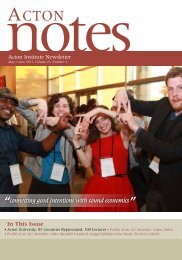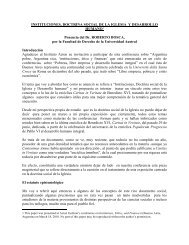In the Liberal TraditionAnders Chydenius [1729–1803]“The more opportunities there are in a Society for somepersons to live upon the toil of others, and the less thoseothers may enjoy the fruits of their work themselves, themore is diligence killed, the former become insolent, thelatter despairing, and both negligent.”Known as the Adam Smith of the North, Anders Chydeniuslaid out his economic prescription for mercantilist [Sweden-Finland] in The National Gain in 1765, suggesting a concept ofspontaneous order eleven years before Adam Smith in TheWealth of Nations: “Every individual spontaneously tries to findthe place and the trade in which he can best increase Nationalgain, if laws do not prevent him from doing so.”For Chydenius, freedom and diligence were the foundations ofan economically prosperous nation; direction from the governmentonly gummed up the gears of a natural system of humaninteraction.Thus the wealth of a Nationconsists in the multitude ofproducts or, rather, in theirvalue; but the multitude ofproducts depends on twochief causes, namely, thenumber of workmen andtheir diligence. Naturewill produce both,when she is left untrammeled… If eitheris lacking, the faultshould be sought inthe laws of the Nation, hardly, however,in any want of laws, but in the impediments that are put in theway of Nature.“Every individual spontaneously tries tofind the place and the trade in which hecan best increase National gain, if lawsdo not prevent him from doing so.”Pastor, politician, writer, doctor, scholar, scientist, experimenterin plant and animal husbandry, economist, musician, proponentof freedom and enterprise—Chydenius was a renaissanceman in the Age of Enlightenment, careful to root his ideas onhuman dignity in divine providence. Chydenius asked:Would the Great Master, who adorns the valley with flowersand covers the cliff itself with grass and mosses, exhibit such agreat mistake in man, his masterpiece, that man should not beable to enrich the globe with as many inhabitants as it can support?That would be a mean thought even in a Pagan, but blasphemyin a Christian, when reading the Almighty’s precept:‘Be fruitful, multiply and fill the earth.’The National Gain, written originally for the Stockholm Diet in1765–66, caused Chydenius’s own party to exclude him fromfuture representation. Chydenius retreated into his parishwork until 1778 where once again he challenged the Diet withhis advocacy for workers’ rights, later set down in a letter to theRoyal Economic Society:The Creator only put people to work, but did not stipulate thetype of work each of them should do. Stealing was the onlything that the Almighty prohibited, but no target was set fordiligence, how far it was allowed to go or what sort of thingssuch diligence produced. He did not tie anyone to the ploughnor did He tie anyone to trade guilds but merely when andwhere each one perceived how best to make a living where hecould better himself.14 Religion&Liberty
Rev. Robert A. SiricoFairness in the MarketHow, in a market setting, can you beassured that you are getting a gooddeal? We all know people who distrustevery price, believe that mostbusiness people are concealing somethingimportant, and have a vague suspicion that every enterpriseis a racket.These people might have a bias, but they do serve a marketfunction. Business must always be aware that its promotionalsand marketing plans must be balanced against the need to inspiretrust always. It is a business asset like no other, and thosewho foster it thrive, while those who do not lose out.But we need to be aware that the price of goods on the marketis not fixed by some eternal law but rather by fluctuationsbased on supply and demand. There is nothing in the structureof the universe that makes paper towels pennies a piece, dishtowels a dollar, and linen tea cloths as high as fifty dollars.These prices are a result of the item’s relative scarcity and its relationshipto the intensity of consumer interest.What is a good deal? It is the point at which buyer and selleragree and exchange property titles. That is all. That is why themedieval theorists who looked into this matter concluded thatthe “just price” and the “just wage” are identical to the marketwage provided there has been no force or fraud and good faithis being shown by all parties.Consider what the old classical economists termed the “diamond-waterparadox.” Why does water, which is necessary forlife, sell for so much less than a diamond, which is not necessary?It has to do with their relative abundance, for the situationwould be completely reversed in a desert where water ishard to come by.To be sure, we make a grave error if we conflate the value ofsomething with its price. Some goods and services of infinitevalue sell for a very low price (I’m thinking here of some booksof prayers I’ve found in thrift stores for pennies!) while somehigh-price items have very low value when considered in amoral sense. But the job of the market is not to provide an objectivemeasure of moral worth, but merely to produce and allocatedemanding goods and services with an eye to efficiency.The price provides us a signal to conserve resources. We wasteresources that are low in price, while we conserve resourcesthat are high in price. We don’t often think about the extent towhich our lives are managed with such signals in mind. But ifyou travel to less developed countries, you find that whatAmericans routinely toss out sells for a very high price in poorcountries.Does this make Americans wasteful or even immoral, as manycommentators claim? Not as a general rule. What is conservationand what is waste can only be measured by the price systemin a market setting. As economies develop, the prices ofnecessities fall, provided the system is working as it should.“The market economy is driven by dynamicchange and innovation...it becomesall the more important, then, thatour sense of what is right and true befixed with an eye to eternal concerns.”Actually the Bible is filled with stories that involve fluctuatingprices. I’m thinking of the parables of the laborers in the vineyard,the pearl of great price, and the treasure in the field. Allinvolve surprising turns of events reflected in price changes.The market economy is driven by dynamic change and innovation,and this can sometimes be destabilizing to our way oflife. It becomes all the more important, then, that our sense ofwhat is right and true be fixed with an eye to eternal concerns.It is morality that is our Rock of Gibraltar in a changing world.Rev. Robert A. Sirico is president of the <strong>Acton</strong> <strong>Institute</strong> for the Studyof Religion and Liberty in Grand Rapids, Michigan.Summer 2006 | Volume 16 | Number 315




